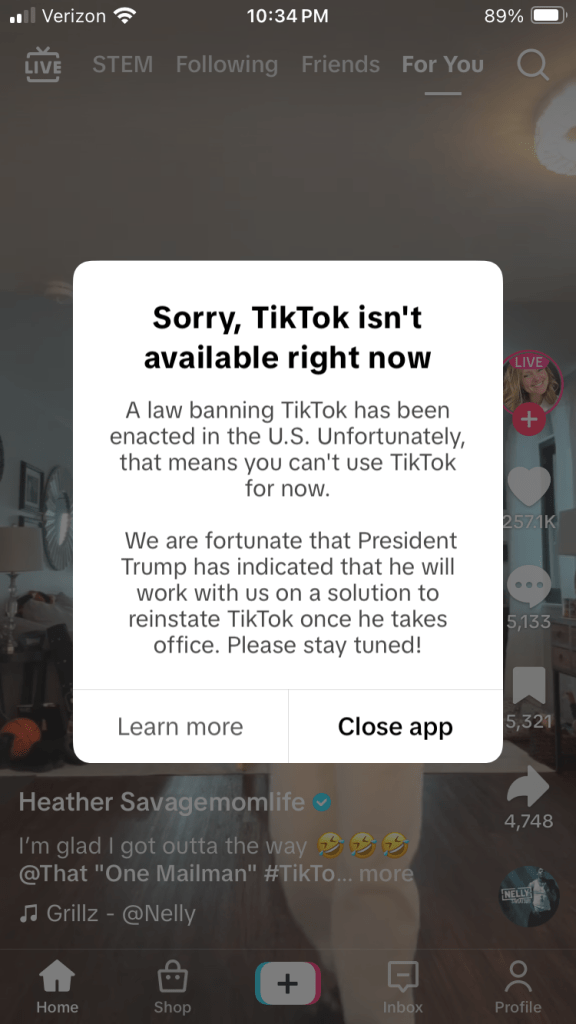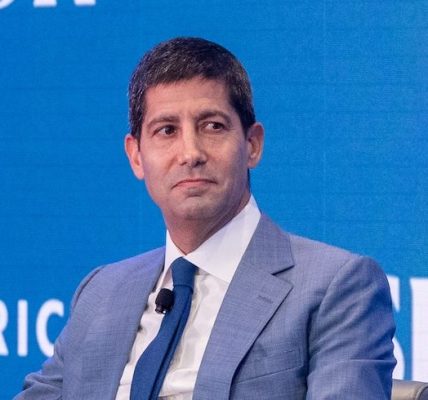On Saturday night at approximately 10:30 p.m. ET, the popular social media platform TikTok officially ceased operations for its users in the United States. At this time, it is uncertain how long this shutdown will last, creating a wave of concern among TikTok’s vast user base. This unexpected development has left many wondering about the future of the app and its content creators, who rely on TikTok for their livelihoods and social interactions.
When users try to access the app during this downtime, they are greeted with a message stating, ?Sorry, TikTok isn?t available right now.? This notification explicitly mentions that a law banning TikTok has been enacted in the U.S., making it impossible for users to access the platform for the time being. The message goes on to express hope that President Trump will collaborate to find a resolution that allows the app to be reinstated once he assumes office, urging users to stay tuned for updates as the situation evolves.
The notification includes a link directing users to TikTok?s official website, where the same information is reiterated. Users are informed that although the app is currently unavailable, they can still log in to their accounts to access and download their data. Additionally, the app has disappeared from both Apple?s App Store and the Google Play Store for Android devices as of Saturday night. Notably, CapCut, a video editing application owned by ByteDance, has also gone offline for users in the U.S., further amplifying the impact of this legislation on ByteDance?s services.
On the previous Friday, TikTok warned that it might be ?compelled to go dark? on January 19 unless it received a clear and definitive commitment from the outgoing Biden administration that its technology partners would not face penalties under the law. This law effectively bans the app in the U.S. unless ByteDance, the China-based parent company, divests its stake in TikTok to a party not located in a country designated as a ?foreign adversary.? This situation has sparked intense discussions about the implications for users and the broader tech landscape.

In an interview on Saturday with NBC News, President-elect Donald Trump indicated that he would ?most likely? issue a 90-day extension to the January 19 deadline. However, it remains unclear whether he possesses the legal authority to do so, considering that the legislation stipulates the U.S. president must certify to Congress that ?relevant binding legal agreements? are in place for ByteDance to carry out a divestment of its TikTok ownership. Currently, there are no known agreements in existence, despite various unsolicited offers for TikTok that have emerged in recent weeks.
The outgoing Biden administration had previously stated it would defer the decision regarding the enforcement of the TikTok divest-or-ban legislation to the Trump administration. In response to TikTok’s alert about its potential blackout due to the impending ban, a representative from the White House dismissed the warning as a ?stunt,? further complicating the situation for TikTok and its users.
White House Press Secretary Karine Jean-Pierre remarked, ?We have seen TikTok?s latest statement. It?s a stunt.? She emphasized that the administration had clearly outlined its position: enforcement of the law would fall to the next administration, which means TikTok and other companies should direct their concerns to them. This statement highlights the ongoing political tensions surrounding the regulation of social media platforms and their implications for national security.
The debate over TikTok?s shutdown escalated after the Supreme Court rejected an appeal by TikTok and its parent company ByteDance, thereby allowing the legislation to proceed. This legal decision underscores the significant challenges that TikTok faces in maintaining its operations in the U.S. amid growing scrutiny and regulation.
Last year, the TikTok divest-or-ban legislation gained substantial bipartisan support, passing the House of Representatives with a vote of 360-58 and the Senate with a vote of 79-18. President Biden officially signed the legislation into law on April 24, marking a critical moment in the ongoing discourse about digital privacy, national security, and the influence of foreign technology companies.
U.S. lawmakers from both political parties have raised concerns that TikTok poses a significant national security threat. They argue that the Chinese communist regime could demand access to data on U.S. users or compel TikTok to disseminate Chinese propaganda. In response, TikTok has consistently maintained that the Chinese government has never made such requests and asserts that it would not comply if such demands were made. The company also emphasizes that 60% of ByteDance’s ownership is represented by international investment firms, further complicating the narrative surrounding its operations.
The post Why Did TikTok Go Dark? US Law Bans App, Which Shuts Down for Users appeared first on Allcelbrities.





